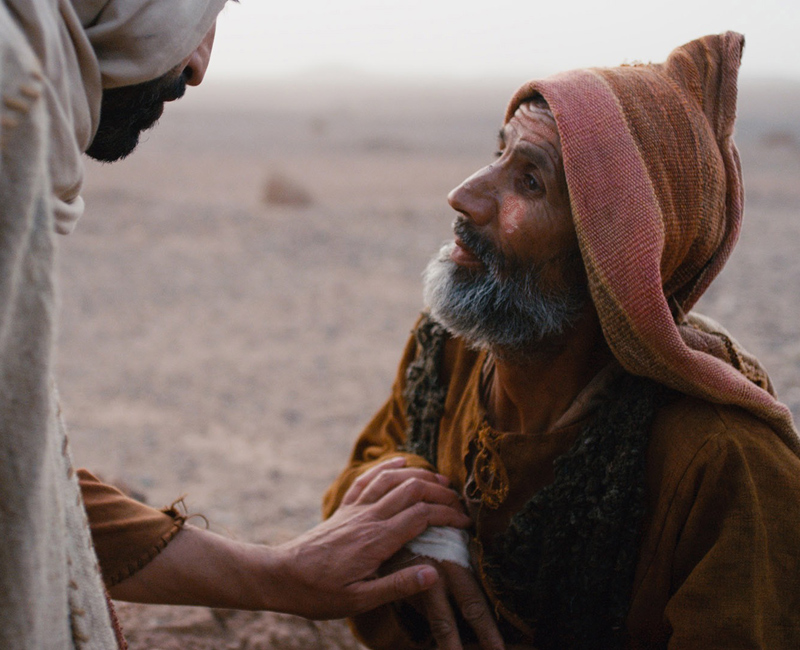"He was so close to beating his addiction, but couldn't quite get free. And now, well now, I'm afraid he's lost to it... completely caught up in its powerful hold."
"She was so close to having beaten cancer. Then, cruelly and suddenly, her immune system broke down on her. Just when we thought she was free of it, infection set in and took her life."
"I thought she was free of those old influences from school. Clearly, she wasn't. They drug her back. Now, she is lost to us, and I fear it's forever."
"He was so close to getting his meds regulated. Then without warning, things got away from him, and he simply couldn't stand it anymore. That's why, uh, you know, that he, uh... well, he just couldn't take it any longer..."
Despite our longing for happy endings, all too frequently they don't occur. I remember a precious family who had to live through such deep pain. Their son's funeral was one of the hardest I have ever done. He was a former drum major, an active part of a youth ministry, and a kid who was well-liked and respected. When he got mixed up in drugs, he never was quite able to get free. One morning, after a year of trying to break his addiction, he went to a park and overdosed. He was tired of putting himself and his family through the hell of his addictions. He was disappointed in himself and the look of frantic concern in the eyes of his parents.
One of the most precious stories in Jesus' ministry involved the healing of a man with leprosy (Mark 1:35-45).[HEALING] The first time I read this story, carefully and thoughtfully, my eyes began to tear with emotion. I was dumbstruck by the tangible expression of Jesus' love for this man. He touched the man while the man was considered a leper. He didn't touch the man to heal him. Jesus touched the man to share in his uncleanness. The Lord wanted to break the isolation that the illness had used to imprison the man. Jesus did touch him to express the love of God to him in an unmistakable and tangible way: through a personal human touch. Jesus touched the man to heal him emotionally. Then, the Lord spoke and physically healed the man.

I cannot fathom what it cost the eternal and almighty God to become human in Jesus. But, he did become one of us. God entered the womb of a young, unmarried, Jewish woman, and became one of us (Philippians 2:5-11). Jesus touching this man with leprosy made the love behind that sacrifice real for me. I love everything about the interchange between Jesus and the man. Well, I love almost everything, except the way the story ends. The ending of this story sounds way too much like it's heading in the direction of all of those "almost, but not quite" situations I shared at the beginning of this article. The healing of the man with leprosy ends this way:
Jesus:
"Don't tell anybody how this happened. Just go and show yourself to the priest so that he can certify you're clean. Perform the ceremony prescribed by Moses as proof of your cleansing, and then you may return home."The man talked everywhere about how Jesus had healed him until Jesus could no longer come into a town openly without the risk of being mobbed. So He remained on the outskirts. Even so, people still sought Him out from far and wide (Mark 1:43-45).[THE VOICE]
Jesus wasn't content just to fix the physical problem. The Lord wanted to heal the whole person. He sought to address the person's spiritual needs, emotional needs, and social needs, as well as the physical ones. For this man who once had leprosy to be reconnected with social life - including returning to a full life at home, in the synagogue, and in the marketplace - he needed to be pronounced clean by a priest. So Jesus' words to this man made perfect sense. Jesus told the healed man to offer proof to the priest that Jesus had fully healed him.
Apparently, the man thought he knew better. He blatantly disobeyed. He did the opposite of keeping quiet and going to the priest. He went out and spread the news to everyone he met. After all, wouldn't it help Jesus more to tell folks about what Jesus had done for him? Didn't people need to know that Jesus was the healer? Shouldn't the man brag about Jesus and all the extraordinary things that the Lord did in his life? What could it hurt for the word to get out that Jesus was a miraculous healer? Why bother with going to a priest to show he had been cured? Didn't his body clearly demonstrate his healing? So he didn't do what Jesus asked; in fact, he did the opposite. He disobeyed.
The result was that Jesus couldn't carry out the mission God gave him to do. He could no longer enter the cities and villages because everyone was looking for him as a healer, not as a Rabbi and certainly not as their Lord (Mark 1:35-38). The Father made sure Jesus accomplished his work. However, the man's disobedience interfered with that occurring as the Father intended.

By disobeying Jesus' command, the man also unwittingly pitted the priesthood against Jesus. The man's behaviors made Jesus appear to be circumventing the priests' assigned spiritual duties in the healing process. Most of all, in an exuberance we all can understand, this freshly healed man chose to disobey and trust his excitement and his heart instead over the command of the Lord. Rather than offering himself as proof to the priest, he showed disregard for the gracious touch of God that he had received from Jesus.
There is a way that appears to be right, but in the end it leads to death (Proverbs 14:12 NIV).Enthusiasm without knowledge is no good; haste makes mistakes (Proverbs 19:2 NIV).
When we understand the grace of God given us in Jesus, our response needs to be obedience, not doing what we feel is best. Even when our intentions are good, part of a gracious and faithful response to God's grace is doing what he calls us to do.
Jesus was very clear about something that often gets overlooked today in our cheap approach to grace:
"Not everyone who says to me, ‘Lord, Lord,' will enter the kingdom of heaven, but only the one who does the will of my Father who is in heaven. Many will say to me on that day, 'Lord, Lord, did we not prophesy in your name and in your name drive out demons and in your name perform many miracles?' Then I will tell them plainly, 'I never knew you. Away from me, you evildoers!'" (Matthew 7:21-23 NIV).
At first, these words may sound harsh. However, the Lord is at work for our full healing. Part of that healing of body, emotions, spirit, and relationships involves a response of obedience. Our obedience is proof that we know we have received grace and trust that the Lord's call for our obedience is a call to bring us into even greater grace.
This principle is clearly out of tune with a religious world that has watered down the Lordship of Jesus to mean doing what we think is right in our hearts. Doing the will of the Father has been, and always will be, the genuine proof that we are Jesus' disciples. Our obedience demonstrates that we have been set free to live life fully in the grace Jesus wants to overflow in our lives.
Then he [Jesus] looked at those seated in a circle around him and said, "Here are my mother and my brothers! Whoever does God's will is my brother and sister and mother" (Mark 3:35).To the Jews who had believed him, Jesus said, "If you hold to my teaching, you are really my disciples. Then you will know the truth, and the truth will set you free" (John 8:31-32).
The Lord wants us to break free of all that entangles our lives so that we can live freely and powerfully in the grace he supplies. He asks us to trust him. Yes, to trust him not just for our salvation, but for our moral choices, our behavior in relationships, and our approach to matters of faith. Our obedience is proof that our faith is genuine, and our appreciation of grace is real.

[HEALING] This post is the final part of a series focused on learning to touch the broken and impact their lives in ways similar to Jesus' ministry to the man with leprosy (Mark 1:35-45). Here are the six parts in the series and links back to those posts:
[RETURN]
[THEVOICE] For this series, unless otherwise indicated, the Bible verses will come from The Voice translation. The references are also linked to the NIV for comparison.
[BACK2POST]
Special thanks for Free Bible Images and The Lumo Project for the use of the images in this post.












Comments
Have thoughts on this article? Leave a comment